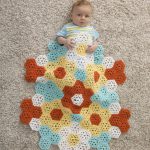You found a pattern that calls for cotton yarn and immediately start searching for the perfect match. Browsing through yarn options you might find that some use the term mercerized cotton in the fiber content. This description is unclear to many people, especially if you have never seen or felt different cottons.
In brief, mercerization is a way of treating cotton that makes it stronger and more receptive to dye. After the process you have a smooth, luminous yarn that is easy to care for.
Like many inventions, the term “mercerized” was derived from the name of the person who created it. In 1844 John Mercer (see the connection?) experimented with using sodium hydroxide to treat cotton. The chemical caused the fiber to swell and compact thus increasing its tensile strength. However, it also resulted in fibers shrinking by as much as 25% percent.
While the idea behind mercerization was good, the shrinkage of fibers was not ideal. In the 1890s H.A. Lowe improved upon Mercer’s idea. He discovered that holding the fibers under tension during the process reduced shrinking and also created a lustrous sheen.
Mercerization can be done on any cellulose fiber (i.e. cotton, hemp, linen) in fabric or yarn form. To mercerize fiber it is submerged in sodium hydroxide (NaOH), also known as caustic soda or lye. This is done in repeated bursts of four minutes or less. While immersed in the solution the fiber is kept under tension (the improvement developed by H.A. Lowe) to prevent shrinkage. An acidic bath is used to neutralize the alkali treatments.
Any cotton fiber can be mercerized, however, long-staple varieties respond best.
24/7 Cotton, shown above, is a worsted weight 100% mercerized cotton from Lion Brand yarn
Neither type of cotton is hands down better than the other. Mercerized cotton will be shinier and stronger than non-mercerized varieties. Dye takes to mercerized cotton easier and thus produces richer tones. Somewhat contradictory to that, non-mercerized yarn will be more absorbent making it a better choice for items like washcloths.
Part of mercerized cotton being stronger means it sacrifices softness. If you are making something where strength of the fabric or structure is important than mercerized cotton will be a better option. An item that relies on softness and drape is better suited for a non-mercerized cotton. However, mercerized cotton will soften with washing and wear and is still useable for garments.
Want to try mercerized cotton for yourself? Lion Brand Yarn offers a worsted weight option, 24/7 Cotton, as well as many patterns to pair it with.




The Coffee Shop Wrap
Coachella Boots
Chelsea Cape
Springtime Stroller Blanket
Savannagal
I wish you’d do a crotchet along tutorial with photos showing how to crochet step by step that cute green bag you show on the newsletter advertising this article. I would so like to make it but I don’t know how to read crochet instructions. I figured out a filet crochet cowl but it took me a long time to find vids showing me exactly what to do. So often I can get started and then something stumps me and I can’t move forward and have to give up. Just showing how to dc or sc is not enough. We need to know how to put it all together, how to turn, how many chains are needed when. There’s so much to know. Thanks for considering my comment.